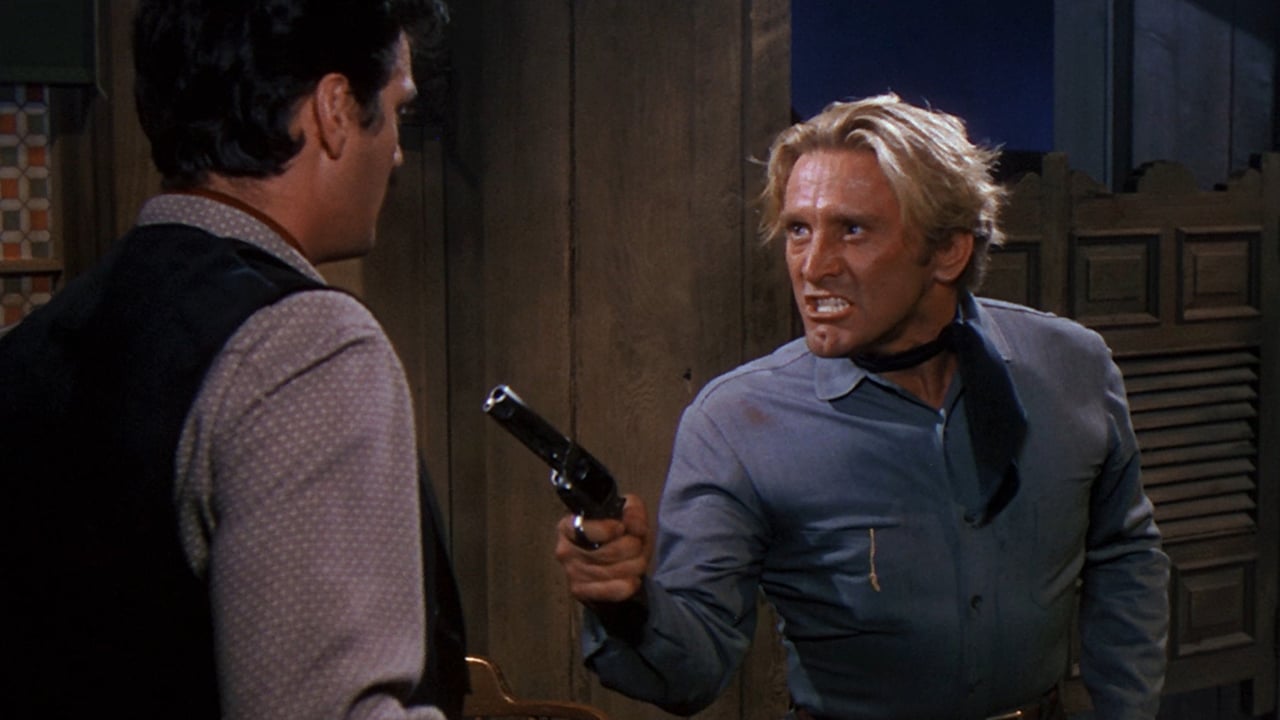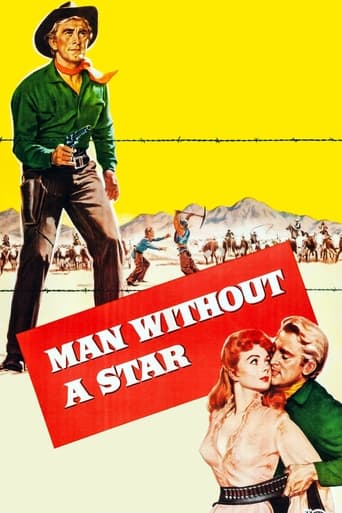

a classic western. with expected ingredients and love story, wise woman and the seductive one, fights, duty, painful memories and the voice of conscience. and , sure, Kirk Douglas who remains the lonely hero who saves the noble causes. to compared with A man called Gannor is not the best option against the detail than Michael Sarrazine is more convincing than William Campbell and to compare Kirk Douglas with Anthony Franciosa remains unfair for the last. but, like many others old movies, the flavor is the basic source of seduction. and the most important. so, a good film. for admire the art of a great actor near by his centenary. and to discover interesting performances of a couple of actresses.
... View MoreOne of those all too bright and cheery semi-comic easygoing Westerns full of stupid men behaving childishly.Were it not for Kirk's star turn and some nice touches in the first half of its running time, this rather silly affair wouldn't be worthwhile at all.The character motivation is all at sea and the hero's barb wire trauma is ridiculous from the get-go.There are some interesting topics hidden among the posturing, but the execution is half-hearted at best.4 out of 10 interior bathrooms
... View MoreJeanne Crain is one of those women who comes off even better in jeans than she does when she's wearing a dress.Coming after "Ruby Gentry" ,which gave Jennifer Jones one of her most intense parts and depicted a mad passion à la "duel in the sun" ,"the man without a star" is a male story though .Kirk Douglas carries the movie upon his strong shoulders and he succeeds in giving a subtle performance ,in a portrayal that shows every side of his fragility and despair ,under the guise of good humor and unlimited self- confidence:the scene in which he shows his chest packs a real wallop;the things we learn about his family tends to indicate he is not the man we thought he was .His pairing with Texas displays echoes of Howard Hawks' "the big sky" (1952):the users who have seen that movie will notice the similarities between the final scenes.The "father"/"son" relationship is common in westerns (see also Ray's "run for cover").
... View MoreThis is a very difficult film to write about, and I have hesitated to do so for some time. But I've now seen it for the fifth (maybe sixth) time, and feel obliged to sing its praises, for it has entertained, even fascinated me each time. It seems, on first viewing, to be a Western like many others: neither the main theme (the beginning of the range wars, brought on by the enclosure of grazing land) nor the main characters (a compendium of Western types), nor the romantic conflict or the younger man mentoring the older man theme are unique. But the interweaving of these themes with the deeply conflicted title character is so seamless and subtle that each one seems to reflect light on the others in a very satisfying way. What is most evident on first viewing is the extreme physical vitality of the playing. Kirk Douglas, for my money, has never been more appealing -- not, in fact, the first word that comes to mind with this very intense actor -- and intense he is here, but also richly comic. In fact, with his intensity, the comedy is often almost nearly that of a burlesque comic (NOT an insult, in my book! -- think of Bert Lahr or Phil Silvers, for two of the best examples). His reaction, for example, on seeing young cowpoke William Campbell "duded up" for the first time, or his dipping his comb in a goldfish bowl to dude up for Jeanne Crain. Nor is Douglas the only wildly vital player. Claire Trevor (in a rather small role, though third billed above the title) is magnificently stagy and yet thoroughly inhabiting her role as a good-hearted madam; Jay C. Flippen really excellent as a ranch foreman, particularly good in a deadpan scene with Douglas, eating dinner while outside, unseen, Campbell and Sheb Wooley are kicking the bejesus out of one another; and, most importantly, Campbell himself (first-featured, but in what is close to a co-starring role with Douglas), very believably callow and quite endearing. On later viewings, what is most remarkable is the fluidity of the characterization of Dempsey (Douglas), who is strongly opposed to barbed wire (i.e. the enclosing of the common herding land), but, faced with Crain's ruthless grabbing of the land (with 30,000 head!) realizes that there is no other way to stop this robber baron. In the end, he has been helpful enough to the small ranchers that they offer him his own herd, and land on which to graze it. His reaction to this is poignant and true to himself: "I just don't like barbed wire." And off he goes, further north, from Wyoming, maybe, who knows?, as far as Canada. For a long time, I was not convinced by Jeanne Crain as, essentially, the film's villain. She is lovely in nice girl roles ("A Letter to Three Wives," "Centennial Summer," "Leave Her to Heaven," being three of her most charming parts), but in this she is meant to be hard and cold -- a real stretch for her. But Vidor has her play the part in a very stylized way, and ultimately I find that her stiff slinkiness is just about right for this part: she is meant to be the embodiment not of evil but, less judgmentally, of someone in mortal conflict with the welfare of the world and society that surrounds her. Interestingly, once Douglas has realized what she is (after she has bedded him simply to get what she wants), she disappears completely from the film. She doesn't even get killed -- she's just gone. A terribly interesting film, and one that bears easily many viewings. I'm glad to read that TMC is showing it with some frequency. I saw it first in Paris (several times during a short revival run) and have been lucky enough to acquire the French DVD. It's very curious that Universal has not seen fit to release this in the U.S. Certainly it's one of their best pictures, and Douglas is certainly a big enough star. But apparently no executive there has developed the necessary enthusiasm to get it released. Too bad. Once again, Europe is ahead of the U.S. in appreciation of our own cultural heritage. May I also put in a vote for another great Vidor picture, "Beyond the Forest," the Bette Davis picture that ended her years at Warner's. Oddly enough, Vidor in interviews has little respect for either of these pictures, but I find him at his very best in these "little" pictures (others being "Stella Dallas" and "The Champ"), where his "big themes" come to the fore from a distance, rather than being foregrounded (as in "The Fountainhead" or "Ruby Gentry").
... View More